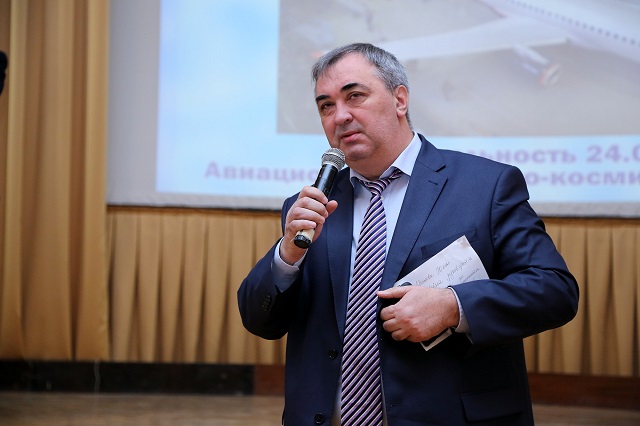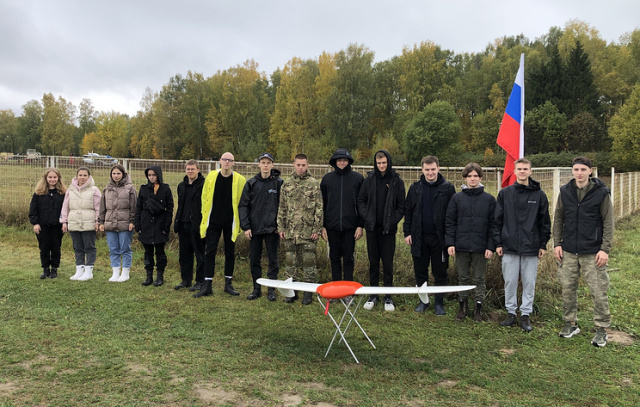TASS — about a new direction of study at the Polytechnic College named after Nikolai GodovikovThe aviation industry using unmanned aerial vehicles (UAVs) is actively developing all over the world.
There is also a growing demand for representatives of a new profession — UAV operators. The Moscow Polytechnic College named after [/b] N.N. Godovikov began training specialists in this field for the first time in Russia — in 2017. What qualities a drone operator should have, where college graduates can work and how teachers in love with aviation turned the usual educational process into an exciting game in which yesterday's ninth graders become real squadron commanders, read the TASS material.
"When a direction in the specialty "Operation of unmanned aircraft systems" appeared at the N.N. Godovikov College, it was necessary to start literally from scratch. We have developed our own training programs with our teaching staff. They did not invent the bicycle, but used those developments of state aviation that were in the In Russia, and adapted the technology of training in state and civil manned aviation to the UAV," said Yuri Nikolaevich Matyko, a college lecturer.
Skills and career
The training is conducted on the basis of general secondary education, students are accepted after the 9th grade. The duration of the program is 3 years and 10 months (5,140 academic hours). Since 2017, the college has already prepared two graduates, a total of 48 specialists. Contrary to stereotypes, the profession of a UAV operator turned out to be attractive not only for boys. "We have both boys and girls studying here, eight of whom have already graduated in our specialty," says Matyko.
The school day begins with a general gathering-building. At each construction, future external pilots make a small thematic report. This is how the guys will learn about outstanding Russian aircraft designers and aviator heroes. "Many motivated guys come to this specialty from families where grandfather or grandmother were aviators, parents work in the aviation industry. They have known and loved aviation since childhood, are aware of all events, attend air shows and exhibitions. Also, guys come to us who understand that now unmanned aircraft is one of the most promising industries," says Matyko.
According to the program, the college provides training in aerial piloting and operation of aircraft up to 30 kg. Graduates should be able to pilot unmanned aerial vehicles, as well as possess the skills of their operation — up to minor repairs, for this there is a workshop on the basis of the college. In addition, operators learn to use the payload that is installed on the drone: a photo or video camera, a thermal imager, a magnetometer, a gas analyzer, a laser scanner, and so on.
Unmanned aircraft is actively used today in a variety of fields. College graduates can work in geodesy, energy, Ministry of Emergency Situations, agriculture and many other fields. "For example, now any surveyor should be able to operate a UAV. Before that, specialists worked with theodolite and roulette, and now they have a new tool — an unmanned aerial vehicle. Drones are slowly being introduced into all spheres of life, there are quite a lot of vacancies," says Vitaly Dolgov, head of the laboratory "External Piloting and Operation of Unmanned Aircraft" of the N.N. Godovikov College, grandson of the famous test parachutist Hero of the Soviet Union Pyotr Ivanovich Dolgov.
Most of the children continue their studies at higher educational institutions after graduating from college. For example, from the first graduation, nine people entered the leading universities of the country — MAI, MGTUGA, Bauman Moscow State Technical University. "We don't even need to monitor how the life of graduates develops. The guys miss us, every week at least one or two people come to visit," says Yuri Matyko.
 |
| Teacher of GBPOU PC named after N.N. Godovikov Yuri Matyko. |
| Source: pkgodovikov.mskobr.ru |
Singing Squadron
The main thing for the drone operator is the speed of reaction, analytical mindset and the ability to make the right decision in a difficult situation. "All the qualities that a graduate should have are formed here, at our base. Upon admission, we do not make such requirements," the teachers of the N.N. Godovikov College note.
A professional operator of an unmanned aerial vehicle must have a huge amount of knowledge. Theoretical training includes the study of the regulatory framework, meteorology, navigation, aerodynamics and much more. "The absolute majority of guys come from scratch, although some have their own copters. When special disciplines start, first of all we begin to acquaint students with the basics of the legislative framework, the Air Code of the Russian Federation," says Yuri Matyko.
A big discovery for many is that, according to the new rules, all drones heavier than 150 g must now be registered — without this, it is forbidden to lift them into the air. "And here we begin to teach that the device must first be registered, get a flight number from the Federal Air Transport Agency, provide documents, apply the appropriate coloring on board, and so on. Do you want to fly? That's the order, the zonal centers of the unified system, order the airspace and then perform your flights. When the guys begin to understand this, these are the first steps to professional improvement," the teacher emphasizes.
During the first year, students learn basic subjects — mathematics, physics. Special disciplines begin with the 4th semester, and that's where the fun begins. One of the methodological techniques used in the educational process is based on the introduction of the method of games. It was his teachers of the N.N. Godovikov College who chose him to train future operators of unmanned aerial vehicles and achieved good results.
"When the guys come to us, they immediately become not just a training group, but a squadron. We teach children that aviation is a collective matter. The guys get a sense of elbow, they get used to the fact that they have a squadron, an aviation unit, a crew. They observe the principle of subordination, learn to correctly submit and execute commands, make decisions," says teacher Alexey Belov. — As a result, future operators of unmanned aerial vehicles are so passionate about the game that the learning process literally absorbs them. Now the guys have an idea to create a singing squadron — like in the movie "Only old men go into battle".
"The squadron commander is appointed from among the most responsible students. The right and left hand of the commander are his deputies for flight training and educational work. We have wall newspapers hanging in the corridors, the guys compete with each other. The Chief of staff is appointed, who keeps all the documents: planning tables, task setting logs — everything is like in manned aviation. When the technical operation module begins, the deputy squadron commander for engineering and aviation service is appointed," says Matyko.
Sometimes guys get upset to tears if they were not appointed to the position of commander. But there's nothing wrong with that — you need to grow up to the commander's post. This has happened, and more than once, everyone has a chance. "Being a commander is statuesque, but it's hard," notes Vitaly Dolgov.
The teachers say that in their practice there has not been a single case of serious disagreements or inconsistencies of people in the crews — each of them is selected taking into account the nature and training. Newcomers do not become a cohesive team right away: first, the guys need to work together, get used to it and draw the right conclusions from mistakes. "Let's say the crew — the commander and the operator — have shortcomings on flights. I ask the elder: why did this happen? Answer: It wasn't me, he did it. And we say: "No, it won't do, you did it, you are a team and you have to check each other," says Dolgov.
Manage from anywhere on Earth
The devices themselves are the pride of the N.N. Godovikov College. There are domestic manufacturers of helicopter and airplane-type drones here. Among them is the Orlan K6 helicopter-type UAV, developed by the Russian enterprise Special Technology Center. The training is also conducted on multicopters of the leading Russian manufacturer — the Geoscan company, including Geoscan-401. In addition, there are various imported drones in the arsenal of the college — Autel, DJI. "These are good basic vessels for studying, in order to understand what a quadrocopter consists of, what knowledge is needed in order to raise it," Vitaly Dolgov stressed.
Also, the laboratory of external piloting and operation of unmanned aircraft of the N.N. Godovikov College is equipped with three types of simulators: "Orlan-10", "Geoscan", "Supercam". This is the real workplace of the UAV operator, from where you can launch the device and control it. "Each workplace is designed for two people — a crew commander and a payload operator who manages the target equipment of the UAV," Yuri Matyko clarifies.
Money for air
The ease of drone control is illusory. Every flight should be preceded by serious preparation. The squadron commander sets a task, determining the area, route and flight task. The guys work a lot with maps, because the airspace is very tense, there are also forbidden zones where flights are unacceptable. "For example, they fly over Moscow only on the ring road — the Ministry of Emergency Situations and the Ministry of Internal Affairs according to a special plan, or during the parade by special permission. The UAV operator prepares for each flight, determines the air zones, looks at where the air routes pass in order to prevent convergence. A person should know navigation well and be able to assess the weather," Matyko emphasizes.
To get the initial stable skills of piloting a UAV, on average, the operator needs to fly ten hours. The guys learn to control small—sized drones right on the college grounds in a special cube and in the gym - inside a protective mesh. Twice a year, field practice is conducted for students at the Novosti airfield (Serpukhov) and the airfield of the Moscow Aviation Institute (MAI) Alferevo (Volokolamsk district). In addition, students of the N.N. Godovikov College participate in championships and have won prizes annually, including the WorldSkills Championship.
Teachers admit that they really lack their own platform for conducting practical classes. "In order to train specialists, it is necessary to fly as much as possible, while each departure to airfields is not cheap," Vitaly Dolgov clarifies. — In addition to renting an airfield for interns, it is necessary to organize accommodation, meals, transfers and medical care, including work with a psychologist."
Also, the N.N. Godovikov College conducts courses of additional professional education in the direction of "Operation of unmanned aircraft systems" for third-party organizations. Teachers make up a program for a specific type of operators.
The College regularly receives appeals from other cities and regions with requests to share their experience. Many educational institutions want to train specialists in a new and very popular specialty. "The door does not close to us, even guests recently came from the aviation college of Ulan-Ude," Yuri Matyko notes. The teaching staff of the N.N. Godovikov College is happy to share their experience with colleagues. At the same time, teachers are sure that if they provide only one teaching method, nothing will work. "It is necessary to organize branches of our program in the regions," Matyko sums up.
Ekaterina Adamova

